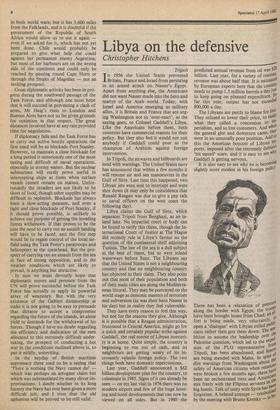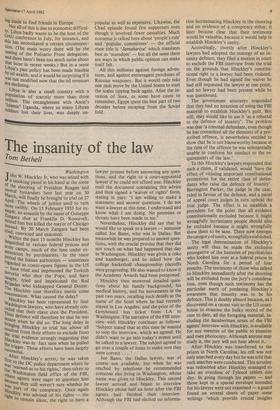Libya on the defensive
Christopher Hitchens
Tripoli
In 1956 the United States prevented Britain, France and Israel from persisting in an armed attack on Nasser's Egypt. Apart from anything else, the Americans did not want Nasser made into the hero and martyr of the Arab world. Today, with Israel and America emerging as military allies, it is Britain and France that are urg- ing Washington not to 'over-react', as the saying goes, to Colonel Gaddafi's Libya. Like the Americans before them, both countries have commercial reasons for their policy. But they also feel it would not suit anybody if Gaddafi could pose as the champion of Arabism against foreign intervention.
In Tripoli, the airwaves and billboards are loud with warnings. The United States navy has announced that within a few months it will resume air and sea manoeuvres in the Gulf of Sirte. Last time this happened, two Libyan jets were sent to intercept and were shot down (it may only be coincidence that Ronald Reagan was due to give a pep talk to naval officers on the west coast the following day).
Libya claims the Gulf of Sirte, which separates Tripoli from Benghazi, as an in- land lake. No impartial court or body can be found to ratify this claim, though the In- ternational Court of Justice at The Hague did recently rule in Libya's favour on the question of the continental shelf adjoining Tunisia. The law of the sea is a dull subject at the best of times, but so were inland waterways before Suez. The Libyans say that the United States is not a neighbouring country and that no neighbouring country has objected to their claim. They also point out that most of their population and both of their main cities are along the Mediterra- nean littoral. They may be portrayed on the world stage as demonic masters of terrorism and subversion (as was their hero Nasser in his day) but in reality they feel vulnerable.
They have every reason to feel this way, but not for the reasons they give. Although it is possible that a Reagan administration, frustrated in Central America, might go for a quick and certainly popular strike against Gaddafi, the real source of Libyan insecuri- ty is at home. Quite simply, the country is beginning to run out of cash, and its neighbours are getting weary of its in- cessantly volatile foreign policy. The two things both have domestic repercussions.
Last year, Gaddafi announced a $62 billion development plan for the country, to culminate in 1985. Signs of it can already be seen — on my last visit in 1976 there was no modern airport and few of the huge hous- ing and hotel developments that can now be viewed on all sides. But in 1980 the
predicted annual revenue from oil was $20 billion. Last year, for a variety of reasons, revenue was about half that. It is estimated by European experts here that the country needs to pump 1.3 million barrels a day Just to keep going on planned expenditure. 5° far this year, output has not exceeded 800,000 a day. The Libyans are partly to blame for this. They refused to lower their price, to tnalce what they called a concession to 101" perialism, and so lost customers. And vihen, the general glut and downturn came, they were in an unusually poor position. Add. to this the American boycott of Libyan on- ports, imposed after the extremely dubious `hit squad' scare, and it is easy to see why Gaddafi is getting nervous.
It is also easy to see why he is beconing slightly more modest in his foreign policy'
There has been a relaxation of pressure along the border with Egypt; the trooPs have been brought home from Chad; an ef,, fort is being made, very reluctantly, open a 'dialogue' with Libyan exiled clans rather then gun them down. The 01_ the Palestine to assume the leadership over I' Palestine question, which led to the expel sion of the PLO representative fr°: Tripoli, has been abandoned, and fenc`i, are being mended with Malta. In spite fe dire warnings from Washington about E" safety of American citizens when relat0i,e were broken a few months ago, there hel's been no orchestrated riots and American mix freely with the Filipino servants in t'n big hotels. Talk of unity with Syria has bced forgotten. A belated attempt — symbollsep, by the meeting with Bruno Kreisky — is k
ing made to find friends in Europe. Not all of this is due to economic difficul- ty. Libya badly wants to be the host of the OAU conference in July, for instance, and this has necessitated a certain circumspec- tion. (The main worry there will be the seating of the Polisario Front delegation, and there hasn't been too much noise about that issue in recent weeks.) But in a sense Libya's past policy has been made feasible by oil wealth, and it would be surprising if it was not modified now that the oil revenues are declining.
Libya is also a small country with a population of scarcely more than three million. The entanglement with Amin's Islamic' Uganda, where so many Libyan soldiers lost their lives, was deeply un- popular as well as expensive. Likewise, the Chad episode found few supporters even though it involved fewer casualties. Much nonsense is talked here about 'people's rule' and 'popular committees' — the official state title is Vamahariya' which translates best as 'massdom' — but all the same there are ways in which public opinion can make itself felt.
All this militates against foreign adven- tures, and against extravagant purchases of Russian weaponry. But it would only take one rash move by the United States to start the scales tipping back again. After the in- vasion of Suez, as some have cause to remember, Egypt spent the best part of two decades before escaping from the Soviet fold.



































 Previous page
Previous page